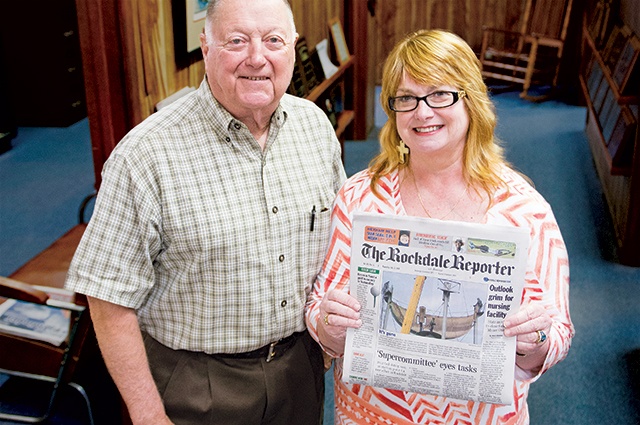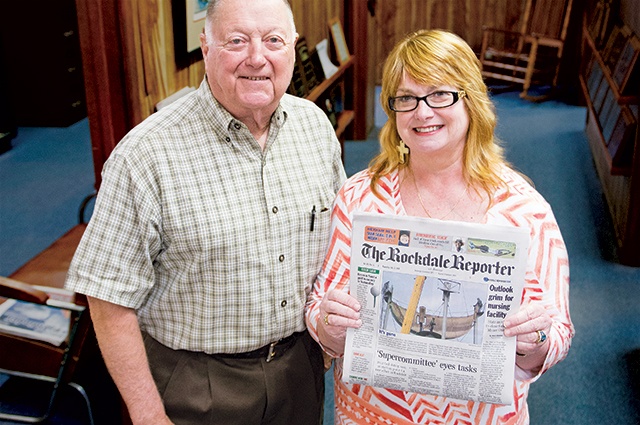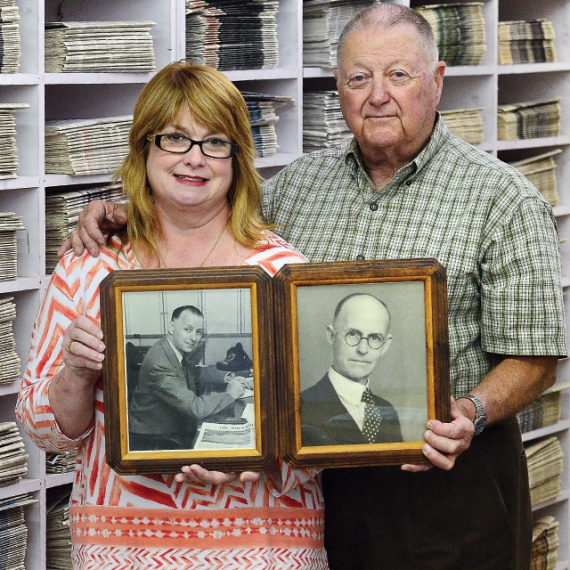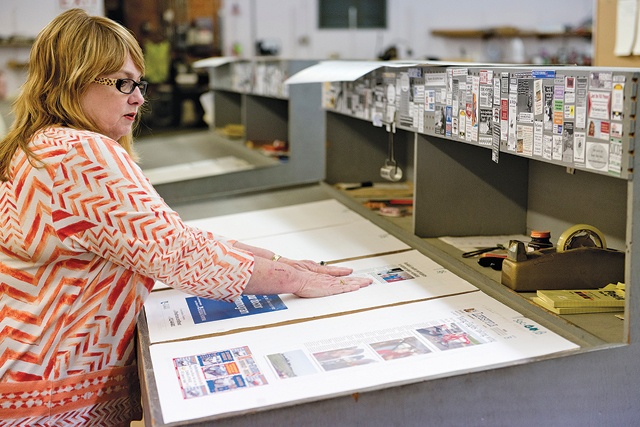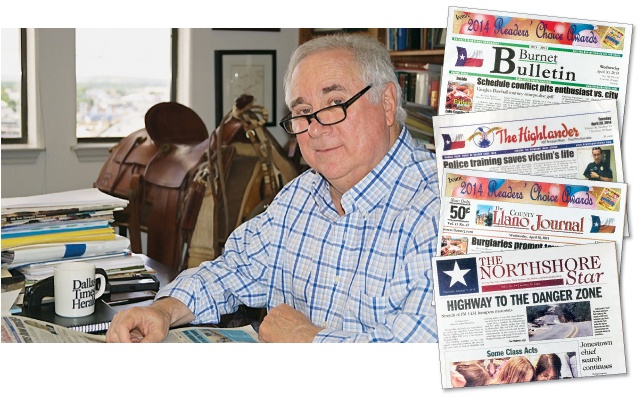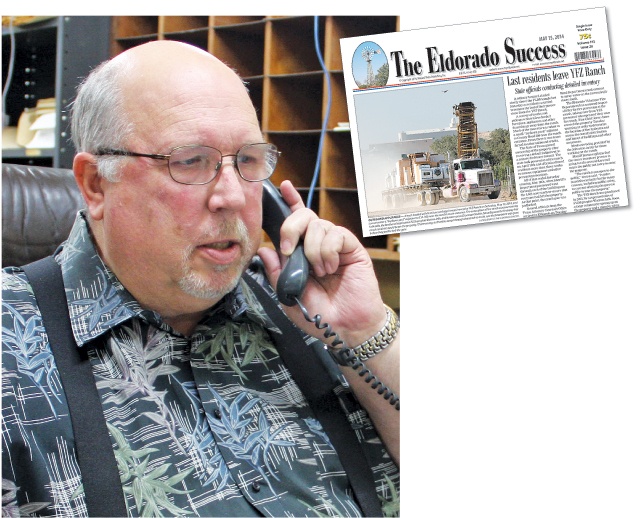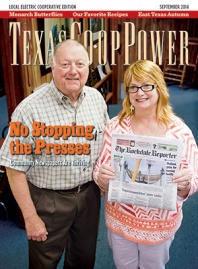In Rockdale, about an hour’s drive northeast of Austin, Rockdale Country Ford purchases a half-page color ad in each week’s newspaper—not for itself, but for other businesses. It’s a gift to a community that in 2008 received devastating news: ALCOA, the area’s largest employer, announced it was closing its aluminum smelter plant. Ultimately, 1,200 workers lost their jobs, with the economic repercussions rolling through the region like a tidal wave.
But six years later, Rockdale is on the financial rebound, with a symbiotic relationship between the business community and The Rockdale Reporter newspaper helping drive the recovery. It’s good karma for local businesses to help each other out, says Eric Paulsen, general sales manager for Rockdale Country Ford.
That same attitude is on display on the pages of The Rockdale Reporter, which since June 1, 1911—103 consecutive years—has been owned by the Cooke family, a household name in Texas community newspaper circles. In the wake of ALCOA’s closing, then-assistant publisher Kathy Cooke stepped into the role of town cheerleader. Weary of hearing the sorrowful, funeral-like questions from people in neighboring locales—“How are y’all doing?”—she would matter-of-factly respond: “We’re going great.”
Yes, says Cooke, who was named the paper’s first female publisher in 2010, some people moved. But many stayed. The Reporter’s circulation of 5,000 sustained only a slight hit. Local businesses started buying more ads. And at the heart of the recovery was the heart of the Cooke family.
“One of the best things about being a family-owned paper is, I’m free to do what I want,” says Cooke, who has not raised advertising rates in five years. “If I were owned by a chain, I’d be required to make a certain amount of profit, whereas it’s just hurting me if we don’t. This community was hit so hard, you just embrace everybody.”
It’s a stance that defines Texas’ community newspaper landscape, where the prevailing philosophy is this: If the community succeeds, the newspaper will succeed.
In the words of veteran editor Roy Bode, who recently sold his Highland Lakes Newspapers group, he’s never been in it as just another business owner. That’s why, he says, he pumped more than $100,000 worth of free and discounted advertising into his newspapers over the past year.
Bode’s journalism path began in West Texas, where in high school he was paid a nickel per column inch for stories he wrote for the Andrews County News. His metro newspaper career was punctuated by three stops at the Dallas Times Herald, first as a reporter in the early 1970s. Ultimately, he was at the helm as editor from 1988 through December 9, 1991, when the Times Herald printed its final edition.
As president, editor and publisher of the Highland Lakes Newspapers group, Bode had come full circle to his small-town roots. But he didn’t leave his big-picture journalism skills behind. Following Bode’s lead, the editorial staffs at the papers in Burnet, Llano, Marble Falls and Lago Vista—where one of Texas’ newest newspapers owes its existence to a handful of tenacious citizens—cover their circulation areas like blankets, reporting on everything from crawfish festivals and youth soccer leagues to serial burglaries and legal battles over water rights.
Like big-city newspapers, the papers give readers hard-hitting news—so hard-hitting that ace reporter James Walker, editor of the Burnet Bulletin and a veteran metro newspaper journalist, was punched at a 2012 election watch party by a local political leader who was upset with Walker’s coverage of a primary race.
But unlike the metros, which strive to represent all levels of news, these four papers, like many other publications around the state, are part of an evolving community newspaper model in Texas that provides the local news readers seem to care most about. These papers mix feel-good stories with coverage of complex, timely and politically controversial issues to produce an all-natural, hometown product.
Metro papers, meanwhile, nationally and in Texas, are struggling. Over the past five years, Texas’ five largest daily newspapers—the Austin American-Statesman, The Dallas Morning News, the Fort Worth Star-Telegram, the Houston Chronicle and the San Antonio Express-News—have suffered overall declines in advertising revenue and print circulation numbers. Cost-cutting measures implemented by corporate owners have resulted in layoffs and voluntary severance packages.
Yet across Texas, community newspapers are thriving, with individual, family and group owners capitalizing on a business strategy that puts community first. The feedback from the 20-plus editors, publishers, owners, reporters, citizen journalists and newspaper industry representatives interviewed in person and by phone for this story is consistent: Overall, advertising revenues are trending up; circulation numbers are holding steady or moderately increasing; and newsroom staffs are being diversified in an effort to cover the news and events that matter most to communities.
Given the troubled state of big-city newspapers, how is this possible? The answer lies in an increasingly popular mainstream media term: hyperlocal journalism, a style of enterprise reporting that gives readers an exclusive view of the news and events within their communities and immediate surrounding areas.
“We were hyperlocal before hyperlocal was cool,” jokes Jim Moser, president and owner of Brenham-based Moser Community Media, which now manages 21 community newspapers with the July 1 acquisition of four Central Texas publications: The Highlander (Marble Falls), Burnet Bulletin, Llano County Journal and The Northshore Star (Lago Vista).
The four papers, previously owned by Bode and his wife, Ellen, are now owned by three principal partners: Jim Moser, his father, Charles Moser, and Mark Henry, the new editor and publisher for the newspaper group the Bodes bought in 2006. The Northshore Star, the group’s newest member, joined the roster in 2013.
In Brenham, Moser works alongside his father, 71-year-old Charles Moser, the company’s consulting executive officer who served as editor and publisher of the Brenham Banner-Press from 1970 through 2010. The 44-year-old Jim Moser brings a high level of professionalism and respect to the community newspaper model, Bode says: “He’s building a hometown media company the right way. It’s a family company, not an investment company in Australia that decided to dabble in newspapering in the U.S.”
Moser, whose childhood duties for the Banner-Press included a bicycle-propelled paper route, describes his family’s three-legged stool of operating principles:
1. Meet community needs by continually improving upon the editorial and advertising product;
2. Take care of employees with competitive pay, the best possible benefits, flexible schedules and a positive work environment; and
3. Make money—robust advertising improves editorial content.
“People feel like talking about profit at a newspaper is a bad thing,” Moser says. “We don’t. A newspaper has to be profitable today to be viable tomorrow.”
The quest for survivability takes on many forms, as seen in the recent merger of four papers—three in the Texas Panhandle and one in southwest Oklahoma, and all located in county seats—into one big weekly: The Red River Sun, a newspaper owned by the Childress-based Blackburn Media Group, that brings together The Childress Index, Hall County Herald, Wellington Leader and The Hollis News (Oklahoma).
As described by Chris Blackburn, CEO of the media group and publisher of The Red River Sun, the publication launched in massive, old-school fashion on Wednesday, June 4, with subscribers in Childress, Memphis (the Hall County seat), Wellington and Hollis waking up to find papers that were thrown by 2 a.m.
Texas Press Association Executive Director Micheal Hodges cautions against seeing such a merger as a new trend. Rather, he explains, it is just one solution for rural, agriculture-based communities losing residents and business in the face of ongoing drought. Community newspaper readership, Hodges continues, hinges on relationships and roots—the elements at the heart of hyperlocal journalism.
At the same time, as Bode puts into perspective, the societal role of the metro newspaper has drastically shifted across a much larger landscape. In the face of intense competition from the Internet, social media, radio and television, metros no longer offer exclusive one-stop shopping for big-ticket sports, state, national and international news and classified advertising.
As news becomes more fragmented, and harder to find in one place, one all-inclusive source of local news and advertising remains—the community newspaper. That includes The Cove Banner, a tabloid-sized weekly paper that debuted Friday, May 2, in the Central Texas town of Copperas Cove.
As co-owners and co-publishers, Larry Hauk and his wife, Joyce, are competing against two other Copperas Cove papers: the Copperas Cove Leader-Press, of which they were co-publishers 2001–13, and the Copperas Cove Herald. “You can’t get our news anywhere else,” Larry Hauk says. “You can’t get my news from the Internet.”
But editorial content and strategy alone don’t explain the success of small-town papers. What’s most important, say the community leaders and newspaper managers interviewed for this story, is that readers are connected to publishers and owners who live and work in the same communities.
Among the faces of these community journalists are those who have traveled wildly diverse journalistic paths. The list includes Randy Mankin, the 59-year-old publisher and editor of The Eldorado Success and a veteran West Texas oilman who served on Eldorado’s city council and as its part-time city administrator before he and his wife, Kathy, bought the weekly newspaper in 1994.
On March 25, 2004, the couple’s intrepid reporting helped Randy break Eldorado’s biggest story ever: The mysterious structure being built just outside town was a compound for a polygamist sect of the Fundamentalist Church of Jesus Christ of Latter-day Saints, not a hunting resort as visiting church leaders had said. Within days, the Mankins’ tiny newsroom was swarmed by national media.
The Mankins decided early on that they would cover all local news, despite protests. At the first Schleicher County Commissioners Court meeting Randy attended as a reporter, a commissioner asked him: “Can we help you?” Mankin, legal pad in hand, said he was there to cover the public meeting. The commissioner looked at the county judge and asked: “Can he do that?” Mankin could, and still does. He also keeps a steady schedule of city council, school board, and water and hospital district meetings.
Mankin’s broad base of knowledge gives residents a unique perspective of the area’s issues, says Eldorado City Administrator Theo Melancon (mel-ON’-sawn). “What Randy provides the city of Eldorado is a treasure that not too many people understand,” Melancon said in a phone interview. “People who read the newspaper are getting a treat.”
The Mankins also own the weekly Big Lake Wildcat, which is edited by their son, J.L. Mankin. Advertising revenue is “way up,” Mankin said in a phone interview, explaining that he and Kathy are leveraging their ability to sell ads for both papers. Continued financial success will boost editorial strategy. “Someone’s got to report the news and defend the right of the public to know what’s going on,” says Mankin, who in June was elected president of the Texas Press Association’s board of directors.
It’s a long-entrenched philosophy at The Rockdale Reporter, where on a Tuesday morning in late May, Publisher Kathy Cooke gives an impromptu tour of the building. There, in the cavernous back room, is the old Linotype machine, with the operator’s chair still in place at the keyboard.
And there, in the front room, are the Rockdale Reporter’s South Texas Press Association Sweepstakes awards, now totaling 17 after the newspaper collected yet another plaque in April. In Division II competition, the Reporter has won six of the last nine Sweepstakes awards—the top honor bestowed by the STPA, the largest regional press association in the U.S.
Cooke moves the tour, and the conversation, to her father’s office, where 78-year-old Bill Cooke works as publisher emeritus. “Work” is the operative word for Bill Cooke, who was named editor in 1962 and publisher in 1981. Although technically retired, he still shows up almost every day, writing a weekly column, overseeing the faith pages and helping his daughter guide the paper’s news coverage.
True to form, Bill pops into his office late morning after a workout at the gym, sitting at his computer to catch up on some work. It’s an ownership model that’s been in place since June 1, 1911, when Kathy’s great-grandfather, John Esten Cooke, published his first issue of the Rockdale paper that was founded in 1893.
What makes the paper’s coverage so special, the 54-year-old Kathy Cooke says, is that her family’s fingerprints are on every story. Her mother, Peggy Cooke, still writes stories, edits and proofreads. Her husband, Bill Martin, is sports editor. Editor Mike Brown, practically a family member, celebrated his 40th year at the paper in June. (Her brother, Ken Esten Cooke, named for his great-grandfather, is a former publisher of The Rockdale Reporter and now is publisher and editor of the Fredericksburg Standard Radio-Post, managed by Moser Community Media.)
In nearby Taylor, Dennis Wade oversees a different newspaper operation as president of Granite Publications, which manages 23 community papers. Granite’s newspaper revenues are up, including at the Taylor Press, of which Wade is publisher and editor.
For the 63-year-old Wade, a natty dresser who sports an assortment of bow ties, every day is spring. His forecast for community newspapers is equally optimistic. “When people are faced with too many choices, they typically go back to what they trust and understand—and that’s the community newspaper,” he says.
Too often, Wade says, metro and community newspapers are painted with the same brush strokes. “Newspapers are not dying,” he says. “The message I’d like to send is that we’re very much alive. We love what we do. We live in these communities. We work in these communities. We go to church in these communities. We are a part of the community, and we want to be part of that community for a long time.”
———————————–
Camille Wheeler is an Austin writer.
Taking Ownership
Snapshot views of four Texas community newspaper models
The Rockdale Reporter
Family ownership model: The Cooke family has owned The Rockdale Reporter, established in 1893, since 1911.
History: Kathy Cooke, the first female publisher of the weekly paper, is continuing a legacy started by her great-grandfather, John Esten Cooke, who published his first issue June 1, 1911. In 1936, he handed the reins to his son W.H. Cooke, who was publisher/editor and publisher emeritus until July 3, 1991—the final day of his life, when he worked a full day at the office. He died at home at the age of 84 sometime after leaving work that day. His son, J.W. “Bill” Cooke, who took over editor’s duties in 1962, became publisher in 1981. Bill Cooke, Kathy’s father, is now publisher emeritus, and Bill’s wife, Peggy, continues to work at the paper. Kathy’s husband, Bill Martin, is sports editor. Editor Mike Brown celebrated his 40th year at the paper in June 2014.
Sweepstakes winner: In April, The Rockdale Reporter captured its 17th South Texas Press Association Sweepstakes Award. It’s the top honor bestowed by the STPA, the largest regional press association in the U.S.
Business outlook: The Reporter’s circulation of 4,500 represents only a slight dip from 2008, when ALCOA closed its aluminum plant. Revenue is moderately increasing as local advertisers continue to pick up the pace.
On the cutting edge: Before 2000, when she joined the newspaper staff, Kathy Cooke spent 16 years working as a Rockdale hairdresser.
Moser Community Media
Family/group management model: Jim Moser is president and owner of Moser Community Media, which began operations in 2005 in Brenham and now manages 21 community newspapers with the July 1 addition of the Highland Lakes Newspapers group (Burnet Bulletin, The Highlander, Llano County Journal and The Northshore Star). Moser’s father, Charles Moser, serves as consulting executive officer.
Newspaper background: Charles Moser was editor and publisher of the Brenham Banner-Press from 1970 to 2010. He is a former director and president of the Texas Daily Newspaper Association, from which he received the Frank Mayborn Award for Community Leadership, and a former director of the Texas Press Association.
Newspapers managed: The Atlanta Citizens Journal, Bowie County Citizens Tribune (New Boston), Burnet Bulletin, The Cass County Sun (Linden), Clifton Record, The Cuero Record, The Fairfield Recorder, Fredericksburg Standard Radio-Post, Groesbeck Journal, The Highlander (Marble Falls), Jackson County Herald-Tribune (Edna), Llano County Journal, The Northshore Star (Lago Vista), Pittsburg Gazette, The Meridian Tribune, The Mexia News, The Robertson County News, San Marcos Daily Record, The Steel Country Bee (Daingerfield), Wimberley View, Yorktown News-View
All in the newspaper family: Ken Esten Cooke, whose sister Kathy Cooke is publisher of The Rockdale Reporter, is publisher/editor of the Fredericksburg Standard Radio-Post. Ken, who is named for his great-grandfather, John Esten Cooke, is former publisher of the Rockdale paper.
Business outlook: Overall, the company’s newspapers are seeing a steady upward revenue trend.
Successful route: Jim Moser, who was publisher of The McKinney Courier-Gazette before starting his own company, grew up working for the Banner-Press, first throwing papers on a bicycle route, then graduating to washing delivery vehicles, working in the pressroom and other duties.
The Eldorado Success
Family-ownership model: Owners Randy Mankin and his wife, Kathy, bought the weekly paper in 1994. Randy serves as publisher and editor, and Kathy is the advertising director. The Mankins also own the weekly Big Lake Wildcat, which is edited by their son, J.L. Mankin.
An unusual path: After the Mankins moved to Eldorado in 1979, Randy followed his father’s career path into West Texas’ oil fields and became a drilling rig manager before eventually owning a contract pumping company. When the oil business dried up, Mankin started putting his Texas Tech University political science degree into practice, serving five years as a city council member and then as Eldorado’s part-time city administrator. Mankin, a self-described news junkie and regular letter writer who frequently visited the newspaper office, ultimately found himself in position to buy the paper. He sought advice from other newspaper owners in the area as he started learning the journalism ropes.
Business outlook: Advertising revenue is “way up,” Randy Mankin says.
Barebones staff: Randy Mankin writes most of the stories; Kathy Mankin takes most of the pictures; and Lupe Elizondo, their utility infielder, as Randy calls her, fields a number of duties, including proofreading, answering the phone and writing features.
Granite Publications
Group management model: Granite Publications manages 23 community newspapers.
President: Dennis Wade, who also serves as editor and publisher of the twice-weekly Taylor Press in Taylor, where Granite Publications is based.
Newspapers managed: Alpine Avalanche, Anahuac Progress, Aransas Pass Progress, The Bandera Bulletin, The Boerne Star, The Cameron Herald, The Colorado County Citizen, Elgin Courier, Fort Stockton Pioneer, Gonzales Inquirer, Hill Country News, Hutto News, The Ingleside Index, The Vindicator (Liberty), The Light & Champion (Center), The Madisonville Meteor, The Marlin Democrat, Mount Pleasant Daily Tribune, Navasota Examiner, The Rosebud News, The Sealy News, Taylor Press, Thorndale Champion
Business outlook: Circulation issues are stabilizing overall; advertising revenues are up.
More bang for the buck: Since Wade’s first job in the early 1970s, when the Beaumont native discovered a passion for selling ads at The Baytown Sun, he has wowed newspaper staffs nationwide as an advertising consultant who understands how revenue helps drive the editorial wheel. From 1994 to 2002, as an independent traveling consultant, he worked in every state except Alaska, helping newspapers create revenue development plans and examine behavioral metrics—the people side of the business. As a community newspaper publisher, Wade is helping local businesses increase their share of market with a mix of weekly advertising and appearances in special sections or inserts. Advertisers are also aligning with high-profile community events, such as high school football games and graduations.
On stage: Wade’s first passion was acting. Four decades ago, while attending San Jacinto College, he played a British maid in the play “Blithe Spirit.” Wade was so believable, that when he joined the rest of the cast onstage for curtain call, the audience didn’t have a clue who he was.
— C.W.
